Wondering what holistic development means and what you as a parent can do to support your child’s growth?
What is Holistic Development in Early Childhood?
Holistic development means developing the whole child – socially, emotionally, physically, intellectually and spiritually.
A child’s home and environment also impact their overall development.
Why is Holistic Development Important?
In order for children to succeed and reach their full potential, all aspects of their development must be given attention.
While it may be easy to default to focusing on a child’s intellectual abilities during the early years, it is equally important for a child to develop skills such as:
- emotional intelligence
- confidence
- social ability
- compassion
- fine and gross motor coordination
- responsibility
- creativity
- and many other skills!
Holistic development is important and is the key to learning in the early years of childhood.
As a parent or teacher, you can start your children on an early learning path to success.
What are the Five Aspects of Holistic Development?
The following are the five key areas of holistic development:
- Physical development – all about growing and developing motor skills.
- Social skills – how children interact with others and communicate in their world.
- Emotional understanding – learning to express emotions in a healthy way.
- Intellectual development – cognitive, creativity and acquiring skills for learning.
- Spiritual development – building morals, values and caring for the world.
The early years are a vital time to lay the foundation for a healthy and happy life.
The following tips will help you create a holistic approach to educating your children.
How to Support the Holistic Development of A Child
Encouraging holistic development in the early years is the responsibility of parents and educators. Taking this approach to your children’s education is not difficult and just requires a little thought.
Starting in the early years, the holistic approach to education is about a balance between the home, the environment and the developing child.
Physical Development
- Understand the physical milestones children will experience. Have a thorough knowledge of the importance of motor skills and how they are developed.
- Engage in gross motor activities or big movements and explore ways to climb, jump, swing and run.
- Take time to practise fine motor skills, or small actions, like holding a crayon, moulding playdough, digging in the sand or playing with blocks.
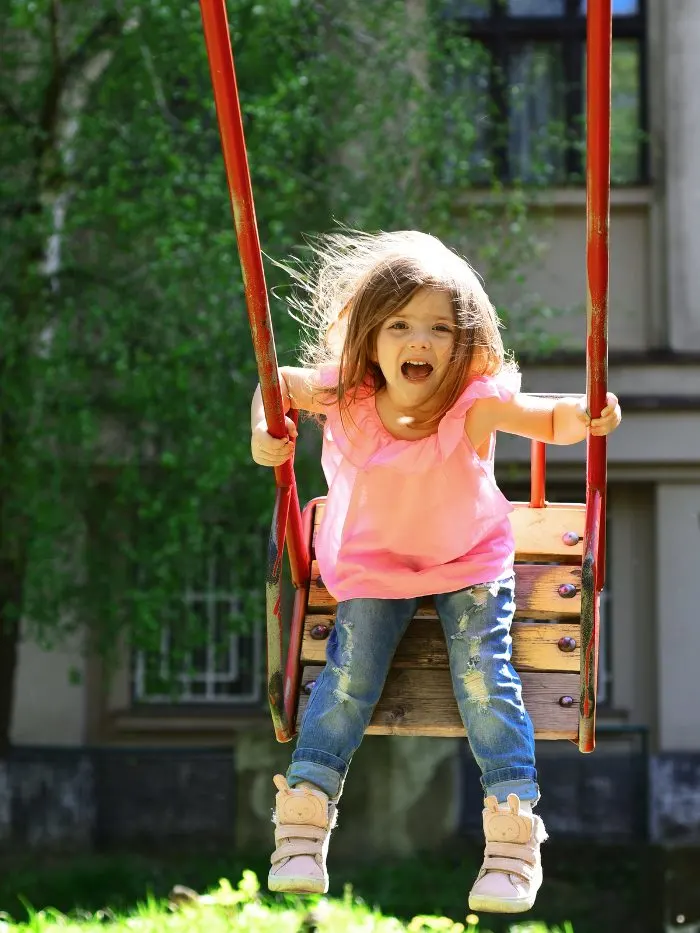
Social Skills
- Build social skills by connecting your child with other children and adults.
- Practise actions like sharing, taking turns, enjoying a meal together or going on an outing.
Emotional Development
- Create awareness of others through books and stories.
- Learn empathy at home and in the community.
- Share experiences and discuss the outcomes of events.
- Be aware of children’s emotional needs.
Intellectual Development
- Developing children’s cognitive skills comes with exposure to play. Play and learn is a very real concept to focus on in the early years. Children are constantly learning at home during free play.
- Active participation is by far the best form of education.
- Reading to children adds to the dynamic of cognitive development creating an interest in many different topics and developing vocabulary.
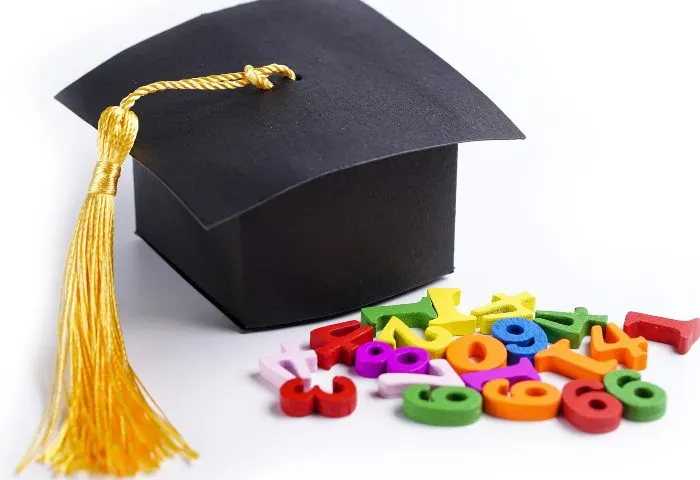
Spiritual Development
- Talk about family morals and values, beliefs and traditions.
- Develop a sense of self and responsibility towards others
- Teach children to take care of the environment outside of the home.
- Set up your child’s bedroom or play area intentionally and encourage your child to respect and enjoy his belongings.
- Participate in the community and branch out whenever possible.
An Example of a Holistic Activity
Try to plan activities from a holistic viewpoint. This may seem challenging at first, but in actual fact, many activities are naturally inclusive of these principles.
Look at the family picnic as an example of a holistic activity. This outing is not just about going on a picnic.
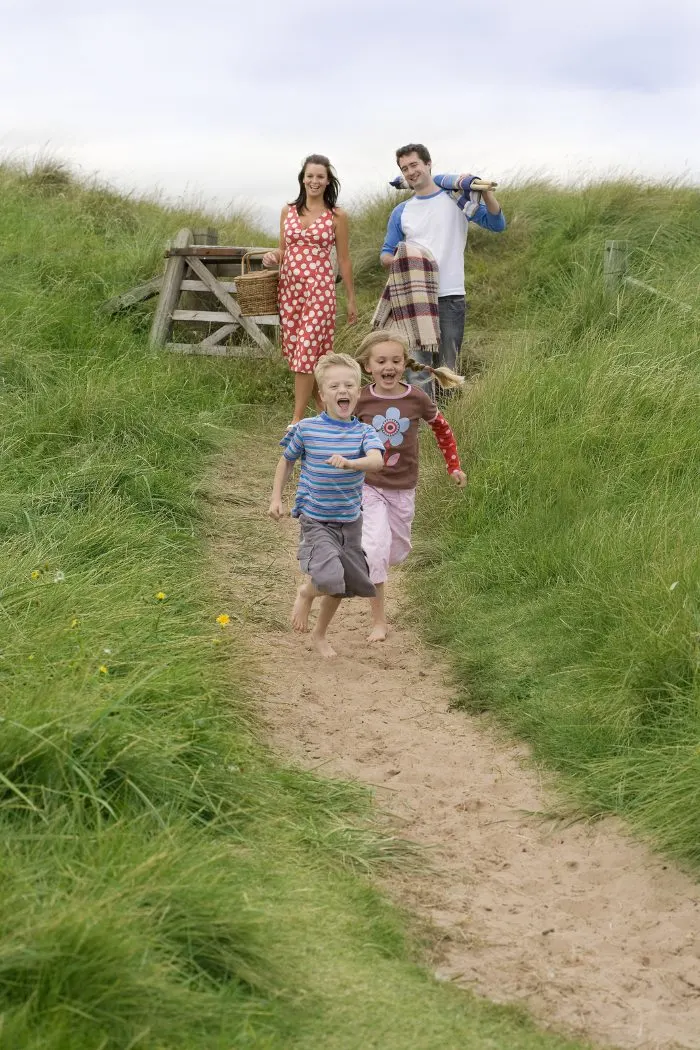
A family picnic is full of opportunities to include social and emotional development while organising and helping with the picnic.
Games at the picnic add to intellectual and gross motor development and a day of interacting with family is a great social-emotional activity.
Added to the picnic experience is time to connect to the outdoors, explore nature and show respect for the environment by not littering.
In this way the picnic ticks all the boxes for organizing a holistic educational experience.
Activities That Do Not Foster Holistic Learning
Activities that are restrictive or sedentary are not going to allow for holistic development.
Broadly speaking, children need to have the freedom to be actively involved in their surroundings. They need to develop their fine and gross motor skills.
Activities should help a child to develop cognitively as well as socially and emotionally.
Activities that are not interactive or hands-on tend to veer away from the holistic approach to development in the early years.
Creating an Environment for Holistic Development
The parts that make up holistic education do not take place individually. When creating a realistic holistic environment, it is very important that many of the individual aspects are included in activities.
Being aware of the five components of holistic development makes it easier for parents to implement the all-around benefits of this concept.
Play and Learn
The idea of playing and learning may seem contradictory. However, this is the way children learn for the first few years.
The value of play in creating a holistic environment is huge. It is through play that children learn so many basic skills.
Play is an aspect of learning that children enjoy. It is non-threatening and the environment surrounding play is engaging.
Giving children the right play materials and the right environment to play in embraces the principles of holistic development.
Parents need to allow their little ones time to explore and become familiar with their surroundings. Creating a safe play environment with the right educational toys and resources is important too.
The Safe Play Environment
Knowing you have a safe environment for your child to play in is a very important aspect of holistic education.
Parents need to have peace of mind when it comes to the activities their children are engaged in. Children need a safe area where they can explore freely and actively.
Here are some points to consider when creating a safe area for play activities.
- Make sure the flooring is level, with some protective covering. It could be rubber matting or carpeting but something to protect your child from the inevitable hard falls.
- Keep outdoor equipment age-appropriate. Remember to check if it is safe to use, free of unwanted nails or splinters and in good order.
- Arrange equipment so there is enough space to run around between items.
- Watch out for sharp edges or pointed dangerous toys. Avoid these kinds of toys, particularly with your very young toddler.
- If your play area is outside it should be a fenced area for safety and security. In particular, look out for any kind of water hazard.
- Keep all dangerous substances away from a free play area. You need to know your child is safe so free exploration can take place.
- Buy your toys wisely. Check on the size, not too small with spare parts that can be a choking hazard or too large and unmanageable. It is wise to check what materials they are made with for parts that can fall off or are peeling and breaking.
- Organize the toys and have them in a safe, accessible spot. A toy basket is a good idea so the toys can be put away easily at ‘tidy-up time.’
- Don’t have too many toys out at once. Rather choose a few at a time and change the contents of the toy basket every so often.
- Show your child how to play with the toys to teach respect for the things they play with. This is especially true for books. Show your child how to turn pages and not tear the paper of lovely storybooks.
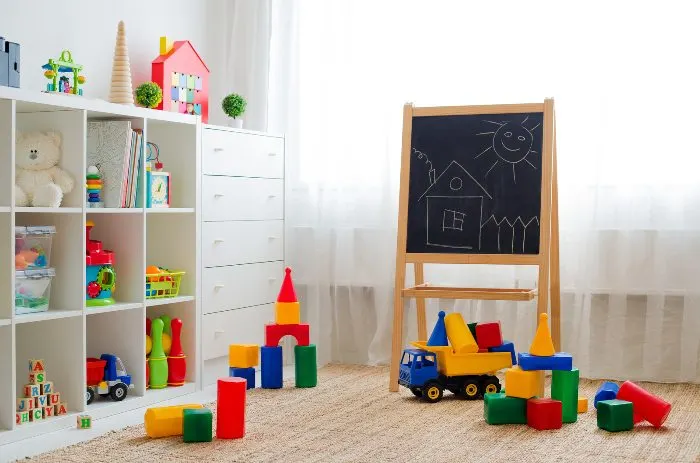
Encouraging Creativity
Thinking creatively is a skill that will help your child to get ahead in all sorts of situations. The creative thinker solves problems, develops new ideas and is innovative. Creativity is not limited to artistic endeavour.
It is important, in the holistic development of the young child, to find ways to try and experiment with new and different materials. Have interesting ‘hands-on’ types of materials available.
Put together a creativity box with paper, pencils and crayons, stickers, duct tape, glue and some recycled items like toilet rolls and used cardboard. The creativity box can be on standby for making things when your child is ready for some creativity.
Guiding some ideas and being supportive is another essential part of encouraging creativity. These five little ideas will keep you focused on creativity with positive reinforcement.
- Make sure there is time to be free to create.
- Always add words of encouragement, never criticism.
- Ask questions about the creation and how it came to be made.
- Share ideas – ‘brainstorm’ solutions.
- Be creative yourself.
Remember creative development is not only a matter of being artistic. Creative ideas are part of mathematical thinking, science, and technology– in fact, anything that has new ideas.
Think out of the box yourself and provide dress-up clothes for drama days, or go on a picnic or treasure hunt, make homemade musical instruments or decorate biscuits in the kitchen.
The area of creativity is limitless and most enjoyable.
The Importance of Developing Language Skills
Developing language skills through holistic play is a vital part of development in the early years of learning. Your child is like a little sponge just waiting to absorb every word you say.
Language skills help children with self-expression, communication and socializing. A child who can communicate is confident and ready to learn new things and explore new areas.
Foster language development by verbalizing your actions, playing games, going on walks and pointing out the scenery, sharing picture books and stories and singing rhymes and songs together.
Everything you do with your early learner becomes a language opportunity. Point to objects, repeat words and phrases and allow your little learner to imitate you all the time. Enriching language should come naturally.

Are you stuck for ideas?
Never fear, you may be surprised at how easy it is to find something that ticks the holistic box to do.
Keep the five elements in mind and go ahead and organize family outings, fun at home in the kitchen, friends over for playdates, and creative waste invention days.
Ask yourself if your plan helps with:
Physical development – all about growing and developing motor skills.
Social skills – how children interact with others and communicate in their world.
Emotional understanding – learning to express emotions in a healthy way.
Intellectual development – cognitive, creativity and acquiring skills for learning.
Spiritual development – morals, values and caring for the world.
This may seem a bit daunting, but simply think ‘It’s all about me!’
Your child learns from within, to deal with the outside world and grow into a sociable, confident, caring human being appreciating the world around them.
In his book, ‘Oh the places you’ll go.’ Dr Seuss wrote:
“Step with great care and great tact,
Remember life’s a great balancing act!
And will you succeed?
Yes! You will indeed (98 and ¾ percent guaranteed!)“
Dr Seuss
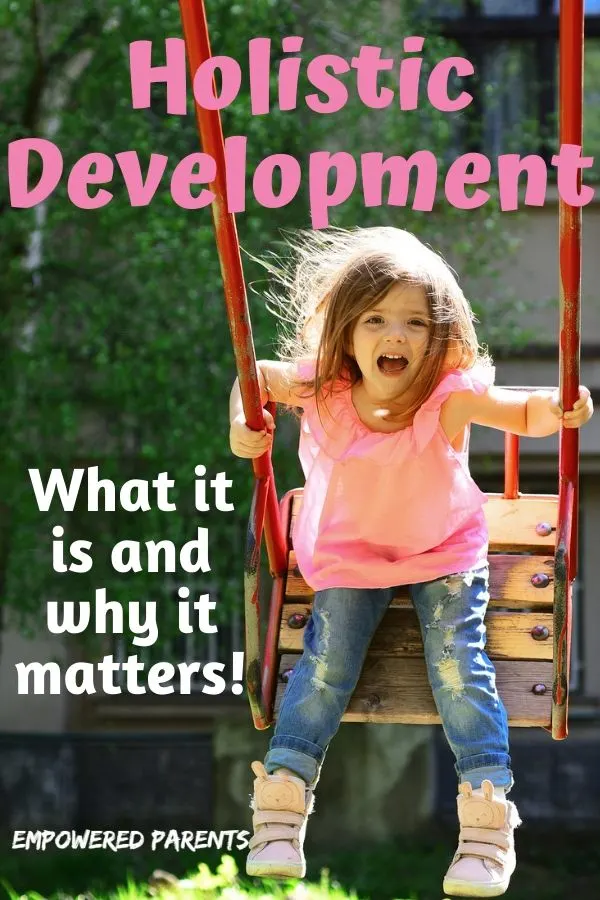
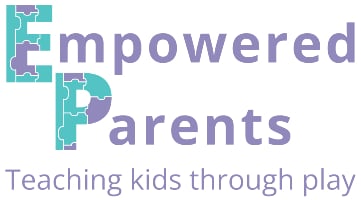
Wednesday 3rd of April 2024
Thank you so much for the information. I have learnt alot
Tanja McIlroy
Wednesday 3rd of April 2024
You're very welcome!
louwaan
Thursday 28th of March 2024
this information is brilliant and super helpful.
Tanja McIlroy
Friday 29th of March 2024
Thanks for reading!
Prudence
Tuesday 20th of February 2024
The information is very helpful and educating.I think every parent and educator must know when preparing or engaging in a activity what is he /she developing. So that we develop our children holistically. Some only concentrate on the cognitive gains and neglecting the others tnx
Tanja McIlroy
Wednesday 21st of February 2024
Thanks for your comment, Prudence!
KEVIN KINGSWELL
Tuesday 25th of July 2023
GREAT STUFF FOR THIS GRANDPA SUPPLY TEACHER, HERE IN QUEENSLAND, AUSTRALIA---THANK YOU!
Tanja Mcilroy
Tuesday 25th of July 2023
You're welcome, Kevin! I'm glad you enjoyed this.
julius k
Wednesday 14th of June 2023
Waoh!A great piece.I'm enlightened and empowered as a parent
Tanja Mcilroy
Thursday 15th of June 2023
Thanks for reading, Julius!